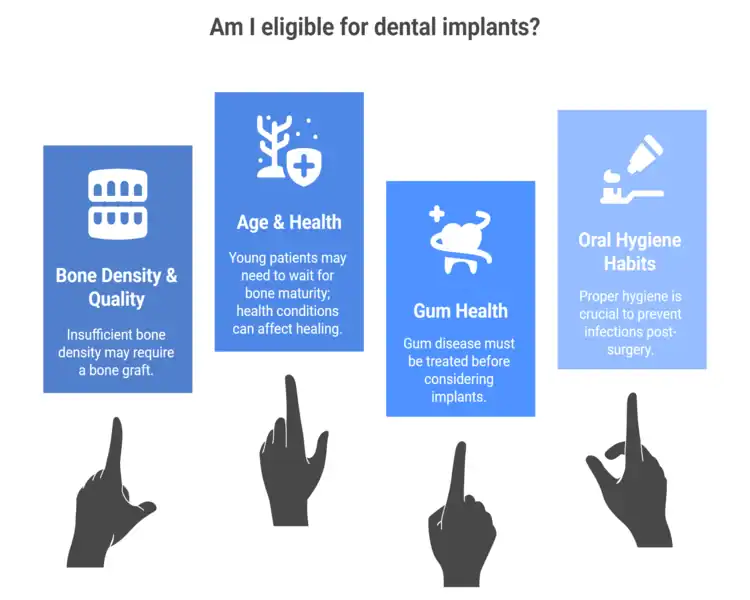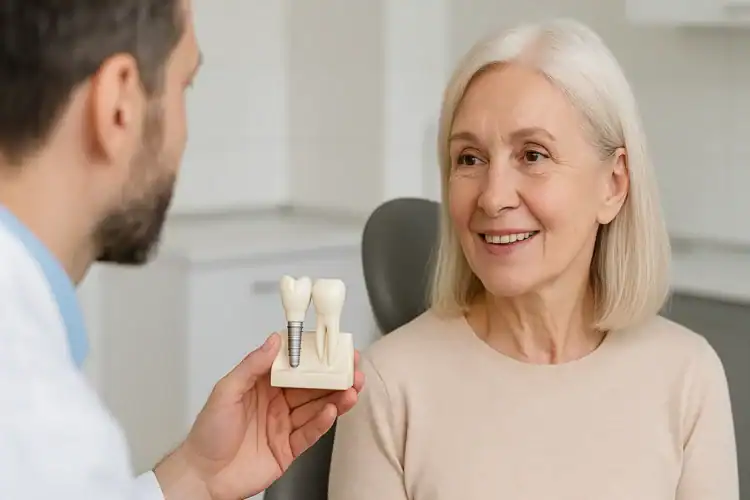Most people can qualify for dental implants, but eligibility depends on several important factors. Healthy gums, sufficient jawbone density, and overall good health are critical for the long-term success of implants. Even if you don’t initially qualify, procedures such as bone grafting or other restorative treatments can often make implants possible.
In this article, we’ll cover who is a good candidate for dental implants, the factors that influence eligibility, and what to expect before, during, and after the procedure. We’ll also discuss potential risks and considerations to help you determine if implants are the right solution for your smile.

Who Is a Good Candidate for Dental Implants?
Not everyone is an ideal candidate for dental implants, but many patients qualify with the right oral health foundation. Below are the main factors that determine your suitability for the procedure:
Healthy Gums and Teeth
Your gums must be free of infection or periodontal disease before implant placement. Inflammation can compromise the healing process and the stability of the implant. Addressing any gum issues with periodontal gum care before the surgery is essential for long-term success.
Sufficient Bone Density
Since implants are anchored directly into your jawbone, adequate bone volume and density are necessary. If bone loss has occurred, your dentist might recommend bone grafting to strengthen the foundation for the implant.
Good Overall Health
Systemic conditions like uncontrolled diabetes, heart disease, or immune disorders can affect healing. Patients should be in stable health before undergoing the implant procedure. A thorough health evaluation helps ensure safety and predictability during surgery.
Non-Smoking Lifestyle
Smoking can significantly slow down healing and increase the risk of implant failure. Dentists often advise quitting smoking before and after the procedure to enhance your chances of success.
Commitment to Oral Hygiene
Dental implants require ongoing care, just like natural teeth. Practicing proper brushing, flossing, and regular dental visits ensures the longevity of your implants. You can also review our related article on good oral care habits at work to maintain your smile daily.
Age and Jaw Maturity
Younger patients should wait until their jawbone has fully developed, usually around age 18. Adults of any age, however, can be excellent candidates if their bone and gum health meet the requirements.
Factors That Affect Dental Implant Eligibility
Several factors affect whether you qualify for dental implants. Here are the most common ones:
- Bone Density & Quality: The most critical factor is bone density. If the jawbone has weakened or shrunk due to tooth loss, you might need a bone graft before getting implants.
- Age & Health: While age is not a direct factor, young patients who are still growing might need to wait until their bones fully mature. Likewise, conditions such as osteoporosis or uncontrolled diabetes can affect bone healing.
- Gum Health: Healthy gums are essential to implant success. If gum disease or infection is present, it should be treated before considering implants.
- Oral Hygiene Habits: Proper oral hygiene is crucial after dental implant surgery. Patients must maintain excellent oral care to prevent infections that could jeopardize the implants.

Each case and each person is different, and a detailed assessment will help determine whether dental implants are suitable for you, as many factors affect dental implant eligibility.
Here’s a note by the FDA that showcases why asking an expert before taking action is important:
“Before choosing dental implants, talk to your dental provider about the potential benefits and risks, and whether you are a candidate for the procedure.”
The Procedure for Getting a Dental Implant
Getting a dental implant is a carefully planned process that involves several stages. Each step is designed to ensure your comfort, long-term success, and a natural-looking result. Here’s how the journey typically unfolds:
Step 1: Initial consultation and evaluation
Your implant process begins with a detailed consultation. The dentist examines your mouth, reviews your dental history, and may take X-rays or 3D scans to assess your bone health and gum condition. This evaluation helps determine whether your jawbone is strong enough to support an implant or if you might need additional procedures, such as a bone graft or sinus lift, before placement.
Step 2: Treatment planning and preparation
Once you’re confirmed as a good candidate, your dentist creates a personalized treatment plan. This plan outlines the number of implants needed, the type of restoration (e.g., crown or bridge), and the timeline for each stage. You’ll also receive guidance on how to prepare for surgery, including oral hygiene instructions or medication adjustments if necessary.
Read more: Bridges vs implants
Step 3: Implant placement surgery
During this stage, the dentist surgically places a small titanium post into your jawbone. This post acts as an artificial tooth root. The procedure is usually performed under local anesthesia, ensuring you remain comfortable and pain-free. After placement, the site is allowed to heal for several weeks or months as the implant fuses with your bone through a natural process called osseointegration.
Step 4: Healing and temporary restoration
While your implant heals, your dentist may place a temporary tooth or restoration to maintain your smile’s appearance. This healing period is crucial; it allows the implant to become securely anchored, forming a stable base for your new tooth.
Step 5: Attaching the abutment and final restoration
Once healing is complete, a small connector piece called an abutment is attached to the implant. Your custom-made crown, dental bridge, or dentures is then secured to the abutment, blending seamlessly with your natural teeth. The result is a strong, functional, and natural-looking replacement that feels just like your own tooth.
Step 6: Aftercare and follow-up
After your implant is complete, regular dental visits and proper oral hygiene are essential to maintain long-term success. Your dentist will schedule follow-up appointments to monitor healing and ensure the implant integrates perfectly with your smile.
Read more: Dental Implants vs. Dentures

Risks and Considerations Before Getting a Dental Implant
While dental implants are one of the most reliable and long-lasting solutions for replacing missing teeth, they still require careful consideration. Understanding the potential risks and factors involved helps you make an informed decision and ensures the best possible outcome.
Here are some important things to keep in mind before getting a dental implant:
- Insufficient bone density or volume
Successful implants rely on a strong and healthy jawbone for support. If the bone is too thin or weakened by bone loss, injury, or long-term tooth loss, it may not support the implant securely. In such cases, a bone graft procedure can help rebuild the area before implant placement. - Gum health and periodontal disease
Healthy gums are essential for implant success. If you have gum disease or chronic inflammation, your dentist must treat it first. Otherwise, bacteria can compromise healing and cause implant failure. - Overall medical conditions
Certain health issues, such as uncontrolled diabetes, autoimmune disorders, or conditions that affect bone healing, can affect the body’s ability to integrate the implant. Your dentist may collaborate with your physician to ensure your health is stable before proceeding. - Smoking and tobacco use
Smoking can delay healing and significantly increase the risk of implant failure. Nicotine reduces blood flow to the gums, making it harder for the implant to bond properly with the bone. Patients who smoke are strongly advised to quit, at least temporarily, before and after surgery. - Sinus and nerve proximity
Implants placed in the upper jaw must be carefully positioned to avoid the sinus cavity, while lower jaw implants should avoid nerve interference. Advanced imaging, such as Cone Beam CT (CBCT), ensures precise placement and minimizes these risks. - Allergies or sensitivity to implant materials
Although rare, some individuals may have sensitivity to titanium or other metals used in implants. If you have a known metal allergy, your dentist may suggest ceramic or zirconia implants as a safe alternative. - Oral hygiene habits and maintenance
Implants require consistent oral care to remain healthy. Poor hygiene can lead to peri-implantitis, an infection that affects the gum and bone surrounding the implant. Regular brushing, flossing, and professional cleanings are key to long-term success.
Dental implants are an excellent and long-lasting solution, but success depends on your bone health, overall wellness, and commitment to aftercare. By addressing these considerations with your dentist in advance, you can greatly increase the likelihood of a smooth procedure and a lifetime of confident smiles.
Contact Us for Help!
If you’re considering dental implants and wondering if you’re a suitable candidate, Tsawwassen Family Dental is here to help.
Contact us today to schedule a consultation, and let our experienced team guide you through the process to restore your smile!
Can You Get Dental Implants?
Dental implants are an excellent long-term solution for missing teeth, but not everyone is automatically eligible. By maintaining good oral and overall health, ensuring sufficient bone density, most people can successfully receive dental implants.
If you think dental implants are right for you, the best decision is to take action now and schedule a consultation at Tsawwassen Family Dental to receive a personalized evaluation tailored to your needs based on your medical history.
FAQ
Wondering if dental implants are the right choice for you? Here are answers to some of the most frequently asked questions to help you make an informed decision.
-
Who is eligible for dental implants?
Candidates are generally those in good health with healthy gums and adequate bone density. Conditions like gum disease must be treated first, and you need enough bone to support the implant.
-
What factors affect my eligibility for dental implants?
Key factors include bone density, overall health, age, and gum health. If you lack sufficient bone, bone grafting may be required.
-
Is the dental implant procedure painful?
Most patients experience minimal discomfort during the procedure due to anesthesia or sedation.
-
What is the recovery time after getting a dental implant?
Recovery takes several months as the implant fuses with the bone. Full healing typically occurs within 3 to 6 months.
-
Can anyone with missing teeth get dental implants, even older adults?
Yes, older adults can typically get dental implants if they are in good overall health and have sufficient bone density.
Still don’t know if you are eligible for dental implants or not?
Ask your questions in the comments section.


